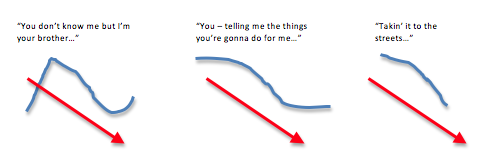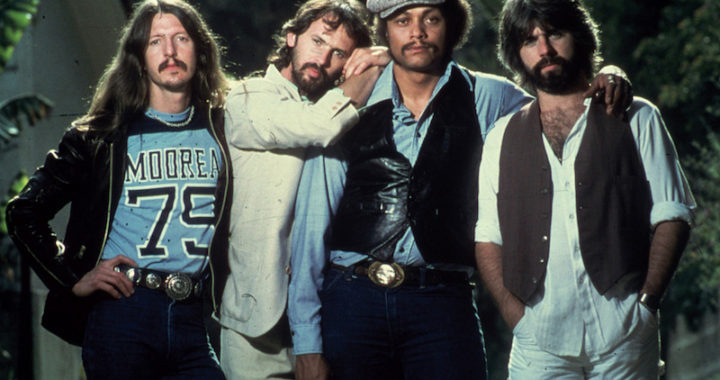It’s a bit of a favourite activity for me to look at hit songs from years ago and try to figure out why some of them fade quickly from the musical radar (“Disco Duck“, by Rick Dees and His Cast of Idiots, No. 1 in 1976), while others never make it to No. 1, but are far more likely to get air play today (“Takin’ It To the Streets“, written by Michael McDonald, recorded by the Doobie Brothers, No. 13 in 1976).
In some cases, it’s easy to figure out. “Disco Duck” soared at a time when disco was raging, but, like most novelty songs, it lived a fast and furious life, disappearing from regular air play once it had past its zenith.
 Got songwriting problems, but don’t know where to begin diagnosing the issues? “Fix Your Songwriting Problems – NOW!” describes 7 of the most common songwriting problems, and offers solutions you can try right away. Get it separately, or as part of “The Essential Secrets of Songwriting 10-eBook Bundle”
Got songwriting problems, but don’t know where to begin diagnosing the issues? “Fix Your Songwriting Problems – NOW!” describes 7 of the most common songwriting problems, and offers solutions you can try right away. Get it separately, or as part of “The Essential Secrets of Songwriting 10-eBook Bundle”
“Takin’ It To the Streets” is much more likely to be heard today on any station featuring oldies. It was recorded 42 years ago, and to most people’s ear still sounds great.
But why is that? Is there any way to predict that a song won’t just be great today, but great in 40 years time?
Several factors come into play that influence a song’s longevity:
1. The Lyric and Its Message.
A long-lasting lyric needs to be able to free itself from the topics of the day, and be, in some way, universal. Does the lyric speak to issues and topics that will likely apply to society in the decades to come? The message of “Takin’ It To the Streets” still resonates: “Take this message to my brother/ You will find him everywhere/ Wherever people live together/ Tied in poverty’s despair.”
The message of “Disco Duck”? Not so much: “I was on the dance floor acting strange/ Flapping my arms I began to cluck/ Look at me… I’m the disco duck…”
2. The Song and Its Structure.
By structure, I’m more talking about how the various elements — melody, rhythm, chords, etc., work and partner together. Most of the time, the strength of this aspect of songwriting works subliminally, since most listeners aren’t overtly aware of how this kind of partnership helps or hurts a song.
With “Takin’ It To the Streets”, you’ll hear that the melodies of the verse, pre-chorus and chorus all link together by virtue of a descending melodic shape:

I also love listening to the bass line, and how it supports the melody in several different ways. The verse features a mainly static bass over a wandering melody. In the pre-chorus we hear the bass begin to move in a similar direction to the melody: mainly downward. In the chorus, the bass line switches direction, moving up as the melody continues downward. Rising bass lines are often associated, subconsciously, with hopefulness and positivity in the message.
3. The Overall Production Value.
It’s hard to escape the sound of the times. You might cringe, for example, at the overly synthesized sound of the music of the 80s, but they had every right to sound that way: it was the 80s!
But if you want a song to live past its time, sticking as much as possible to acoustic instruments, and the standard pop/rock instrumentation of guitar-bass-drums, gives you your best shot at writing something that’s going to last past the day you recorded it.
Summary
It’s fair enough to think that you’ve got enough to worry about just getting your song noticed that you shouldn’t also have to think about how your grandchildren’s generation will receive it.
But I think it is worth thinking about, especially considering your song’s message. Good lyrics practically always address universal issues to which all people will be able to have an emotional connection.
And a powerful, universal message, conveyed by a well-written lyric, will, more than any other element, be the most important determiner for song longevity.
 Written by Gary Ewer. Follow Gary on Twitter
Written by Gary Ewer. Follow Gary on Twitter
 If you’re ready to address the problems you’re facing when trying to write a good lyric, you need “Use Your Words! Developing a Lyrics-First Songwriting Process.” Right now, it’s FREE with your purchase of “The Essential Secrets of Songwriting 10-eBook Bundle.
If you’re ready to address the problems you’re facing when trying to write a good lyric, you need “Use Your Words! Developing a Lyrics-First Songwriting Process.” Right now, it’s FREE with your purchase of “The Essential Secrets of Songwriting 10-eBook Bundle.










